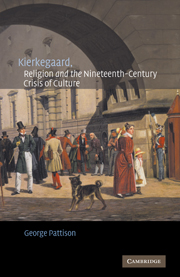Book contents
- Frontmatter
- Contents
- Preface
- Acknowledgements
- List of abbreviations
- 1 The sublime, the city and the present age
- 2 Kierkegaard and the world of the feuilletons
- 3 The present age: the age of the city
- 4 ‘Cosmopolitan faces’
- 5 Food for thought
- 6 A literary scandal
- 7 The reception of Either/Or
- 8 New Year's Day
- 9 Kierkegaard and the nineteenth century (1) Manet
- 10 Kierkegaard and the nineteenth century (2) Dostoevsky
- 11 Learning to read the signs of the times
- Bibliography
- Index
2 - Kierkegaard and the world of the feuilletons
Published online by Cambridge University Press: 22 September 2009
- Frontmatter
- Contents
- Preface
- Acknowledgements
- List of abbreviations
- 1 The sublime, the city and the present age
- 2 Kierkegaard and the world of the feuilletons
- 3 The present age: the age of the city
- 4 ‘Cosmopolitan faces’
- 5 Food for thought
- 6 A literary scandal
- 7 The reception of Either/Or
- 8 New Year's Day
- 9 Kierkegaard and the nineteenth century (1) Manet
- 10 Kierkegaard and the nineteenth century (2) Dostoevsky
- 11 Learning to read the signs of the times
- Bibliography
- Index
Summary
In the preceding chapter I attempted to show how the motif of anxious sublimity brings into focus a region of Kierkegaardian thought marked by deeply divergent but tightly intertwined dualities. Such dualities include nature and freedom, representation and what eludes representation, the moment of time that is mere flux and the moment that is the moment of vision in which time is grasped as the possibility of a relation to the eternal. Following on from this I suggested that, for Kierkegaard, these tensions become most urgently concrete at the point at which the apparently empty, trivial ephemerality of contemporary urban culture (and, quite specifically, the culture of his contemporary Copenhagen) discloses the possibility of the eternal.
But in what medium is such a disclosure to be communicated? What kind of visible script must be used by the writer whose task it is to write the invisible script of the eternal's presence here in Amager Square? Kierkegaard's answer, we might say, is simply the authorship that he bequeathed us, the pseudonymous and the signed works, the published works and the journals and papers – a single, complex and epochal report to history of the possibility of Christian existence in, with and under the conditions of a merely aesthetic urbanized age of reflection. In recent years it is above all the ‘indirect’ aspect of this authorship, the subversive, oblique, ironic and coquettish war-games of the pseudonyms, that has most engaged the attention of commentators.
- Type
- Chapter
- Information
- Publisher: Cambridge University PressPrint publication year: 2002



